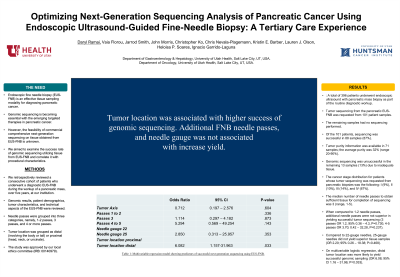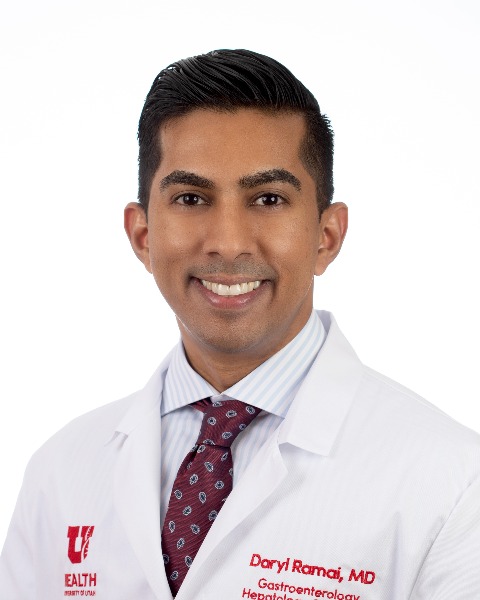Tuesday Poster Session
Category: Interventional Endoscopy
P3713 - Optimizing Next-Generation Sequencing Analysis of Pancreatic Cancer Using Endoscopic Ultrasound-Guided Fine-Needle Biopsy: A Tertiary Care Experience
Tuesday, October 24, 2023
10:30 AM - 4:00 PM PT
Location: Exhibit Hall


Daryl Ramai, MD, MSc
University of Utah
Salt Lake City, UT
Presenting Author(s)
Vaia Florou, MD1, Daryl Ramai, MD, MSc2, John Morris, MD1, Christopher Ko, MD1, Kathryn Byrne, MD1, Douglas G. Adler, MD3, Jarrod Smith, MD1, Chris Nevala-Plagemann,, MD1, Kristin Barber, MD1, Lauren Olson, MD1, Heloisa Soares, MD1, Ignacio Garrido-Laguna, MD1
1University of Utah Health, Salt Lake City, UT; 2University of Utah, Salt Lake City, UT; 3Center for Advanced Therapeutic (CATE), Centura Health, Porter Adventist Hospital, Peak Gastroenterology, Denver, CO
Introduction: Endoscopic fine needle biopsy (EUS-FNB) is an effective tissue sampling modality for diagnosing pancreatic cancer. Genomic sequencing is becoming essential with the emerging targeted therapies in pancreatic cancer. However, the feasibility of commercial comprehensive next-generation sequencing on tissue obtained from EUS-FNB is unknown. We aimed to examine the success rate of genomic sequencing utilizing tissue from EUS-FNB and correlate it with procedural characteristics.
Methods: We retrospectively reviewed a consecutive cohort of patients who underwent a diagnostic EUS-FNB during the workup of a pancreatic mass, over five years, at our institution. Genomic results, patient demographics, tumor characteristics, and technical aspects of the EUS-FNB were reviewed. Needle passes were grouped into three categories, namely, 1-2 passes, 3 passes, and 4 or more passes. Tumor location was grouped as distal (involving the body or tail) or proximal (head, neck, or uncinate).
Results: A total of 396 patients underwent endoscopic ultrasound with pancreatic mass biopsy as part of the routine diagnostic workup. Tumor sequencing from the pancreatic EUS-FNB was requested from 101 patient samples. The remaining samples had no sequencing performed. Of the 101 patients, sequencing was successful in 88 samples (87%). Tumor purity information was available in 71 samples; the average purity was 32% (range 20-90%). Genomic sequencing was unsuccessful in the remaining 13 samples (13%) due to inadequate tissue. The cancer stage distribution was the following: I (9%), II (10%), III (14%), and IV (67%). The median number of needle passes to obtain sufficient tissue for completion of sequencing was 3 (range, 1-5). When compared to 1-2 needle passes, additional needle passes were not superior in yielding successful tumor sequencing (3 passes OR 1.2, 95% 0.36 – 4.3, P=0.730; 4-5 passes OR 3.70; 0.42 – 32.28, P=0.237). Compared to 22-gauge needles, 25-gauge needles did not yield superior tissue samples (OR 2.20; 95% 0.26 – 18.38; P=0.468). On multivariable logistic regression (table 1), distal tumor location was more likely to yield successful genomic sampling (OR 6.08; 95% CI 1.16 – 31.96; P=0.033).
Discussion: Comprehensive genomic sequencing of all stages of pancreatic cancer can be achieved using EUS-FNB. Tumor location was associated with higher success of genomic sequencing. Additional FNB needle passes, and needle gauge was not associated with increased yield.
Disclosures:
Vaia Florou, MD1, Daryl Ramai, MD, MSc2, John Morris, MD1, Christopher Ko, MD1, Kathryn Byrne, MD1, Douglas G. Adler, MD3, Jarrod Smith, MD1, Chris Nevala-Plagemann,, MD1, Kristin Barber, MD1, Lauren Olson, MD1, Heloisa Soares, MD1, Ignacio Garrido-Laguna, MD1. P3713 - Optimizing Next-Generation Sequencing Analysis of Pancreatic Cancer Using Endoscopic Ultrasound-Guided Fine-Needle Biopsy: A Tertiary Care Experience, ACG 2023 Annual Scientific Meeting Abstracts. Vancouver, BC, Canada: American College of Gastroenterology.
1University of Utah Health, Salt Lake City, UT; 2University of Utah, Salt Lake City, UT; 3Center for Advanced Therapeutic (CATE), Centura Health, Porter Adventist Hospital, Peak Gastroenterology, Denver, CO
Introduction: Endoscopic fine needle biopsy (EUS-FNB) is an effective tissue sampling modality for diagnosing pancreatic cancer. Genomic sequencing is becoming essential with the emerging targeted therapies in pancreatic cancer. However, the feasibility of commercial comprehensive next-generation sequencing on tissue obtained from EUS-FNB is unknown. We aimed to examine the success rate of genomic sequencing utilizing tissue from EUS-FNB and correlate it with procedural characteristics.
Methods: We retrospectively reviewed a consecutive cohort of patients who underwent a diagnostic EUS-FNB during the workup of a pancreatic mass, over five years, at our institution. Genomic results, patient demographics, tumor characteristics, and technical aspects of the EUS-FNB were reviewed. Needle passes were grouped into three categories, namely, 1-2 passes, 3 passes, and 4 or more passes. Tumor location was grouped as distal (involving the body or tail) or proximal (head, neck, or uncinate).
Results: A total of 396 patients underwent endoscopic ultrasound with pancreatic mass biopsy as part of the routine diagnostic workup. Tumor sequencing from the pancreatic EUS-FNB was requested from 101 patient samples. The remaining samples had no sequencing performed. Of the 101 patients, sequencing was successful in 88 samples (87%). Tumor purity information was available in 71 samples; the average purity was 32% (range 20-90%). Genomic sequencing was unsuccessful in the remaining 13 samples (13%) due to inadequate tissue. The cancer stage distribution was the following: I (9%), II (10%), III (14%), and IV (67%). The median number of needle passes to obtain sufficient tissue for completion of sequencing was 3 (range, 1-5). When compared to 1-2 needle passes, additional needle passes were not superior in yielding successful tumor sequencing (3 passes OR 1.2, 95% 0.36 – 4.3, P=0.730; 4-5 passes OR 3.70; 0.42 – 32.28, P=0.237). Compared to 22-gauge needles, 25-gauge needles did not yield superior tissue samples (OR 2.20; 95% 0.26 – 18.38; P=0.468). On multivariable logistic regression (table 1), distal tumor location was more likely to yield successful genomic sampling (OR 6.08; 95% CI 1.16 – 31.96; P=0.033).
Discussion: Comprehensive genomic sequencing of all stages of pancreatic cancer can be achieved using EUS-FNB. Tumor location was associated with higher success of genomic sequencing. Additional FNB needle passes, and needle gauge was not associated with increased yield.
Disclosures:
Vaia Florou indicated no relevant financial relationships.
Daryl Ramai indicated no relevant financial relationships.
John Morris indicated no relevant financial relationships.
Christopher Ko indicated no relevant financial relationships.
Kathryn Byrne indicated no relevant financial relationships.
Douglas Adler indicated no relevant financial relationships.
Jarrod Smith indicated no relevant financial relationships.
Chris Nevala-Plagemann, indicated no relevant financial relationships.
Kristin Barber indicated no relevant financial relationships.
Lauren Olson indicated no relevant financial relationships.
Heloisa Soares indicated no relevant financial relationships.
Ignacio Garrido-Laguna indicated no relevant financial relationships.
Vaia Florou, MD1, Daryl Ramai, MD, MSc2, John Morris, MD1, Christopher Ko, MD1, Kathryn Byrne, MD1, Douglas G. Adler, MD3, Jarrod Smith, MD1, Chris Nevala-Plagemann,, MD1, Kristin Barber, MD1, Lauren Olson, MD1, Heloisa Soares, MD1, Ignacio Garrido-Laguna, MD1. P3713 - Optimizing Next-Generation Sequencing Analysis of Pancreatic Cancer Using Endoscopic Ultrasound-Guided Fine-Needle Biopsy: A Tertiary Care Experience, ACG 2023 Annual Scientific Meeting Abstracts. Vancouver, BC, Canada: American College of Gastroenterology.
